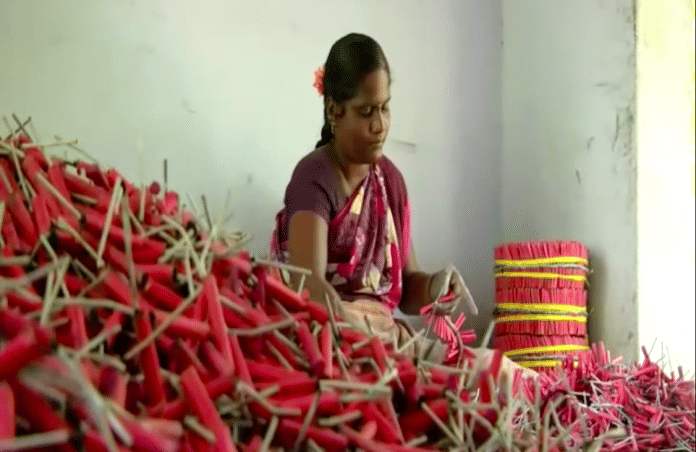No job cuts, but Tamil Nadu’s firecracker factories reduce production and slash wages of workers; allied industries like packaging and transport also hit.
Sivakasi (Tamil Nadu): Demonetisation, GST and the Supreme Court ban on firecrackers in the National Capital Region caused huge losses in India’s fireworks industry hub of Sivakasi but did not lead to job losses.
Sounds like good news? Not really.
Workers say the distress almost feels like being unemployed as fireworks factories have cut production and slashed wages just to keep the ball rolling.
“The entire population of Sivakasi is dependent on the fireworks industry. It’s a difficult time and we had to reduce the wages of workers due to a dip in our production,” Vinayaga Murthy, president of Small Fireworks Manufacturers’ Association, told ThePrint.
According to industry insiders, manufacturers have cut their production by almost 40 per cent in the past few months
Sivakasi in Virudhunagar district has been India’s firecracker manufacturing hub for nearly a century now. The economy of the entire district is dependent on Sivakasi, which is also known for printing and match factories.
There are close to 850 fireworks factories in Sivakasi, of which about 200 are small units. The annual turnover of this industry is Rs 4,000-5,000 crore, say insiders. Close to 3 lakh workers are directly employed in the fireworks units, while another 5 lakh work for allied industries such as matchbox making, printing, transport and sales.
“Even before demonetisation and GST came in, we faced obstacles such as the entry of Chinese crackers in the market. But somehow, we managed to tackle the issue,” said A. Asaithambi, president of the Tamil Nadu Fireworks and Amorces Manufacturers’ Association.
The note ban had suddenly stopped the flow of funds and customers were reluctant to spend money on fireworks, manufacturers claim. Now, after the introduction of GST, prices of their products have increased by 20 per cent, leading to a dip in sales.
“It is a very challenging field,” Asaithambi added. Running a fireworks factory is a tedious work as it involves dealing with nearly 20 government departments such as revenue, police, fire services, and explosives.
Last month, the Supreme Court had modified its 2016 ruling of suspending permanent licences for sale of firecrackers from NCR, leading to a surge in orders in Sivakasi. However, the top court re-imposed the ban on sales earlier this month, leaving a dampening effect on entire industry. “This is nothing but double-standards and our businesses have taken a hit due to this,” said Asaithambi.
Muthu Selvam, a daily wage labourer, has been working in the fireworks industry for the past 15 years. He has changed four different factories since GST came into effect in July this year.
“For every vacancy, you can see 10 workers standing in a queue. There are few openings but too much competition,” he added.
A factory owner said on condition of anonymity that it took him quite some time to overcome the effects of demonetisation. “But we are yet to assess the complete impact of GST. According to rough estimates, our production has reduced by 15 and 25 per cent due to effects of demonetisation and GST, respectively,” he said.
Many of them cleared their stocks but yet to get complete payment from traders in various parts of the country. “If the goods return, we will have to divert them to marriage ceremonies. That’s the only way to earn some money” the factory owner added.
A number of auxiliary sectors such as packaging and transport are also dependent on the fireworks factories, some of whose owners run educational institutions like schools, polytechnics, and colleges in the town.
“If the GST rate is not reduced, it will be very difficult for us to continue with our business,” said Asaithambi.
Although the central government has initiated steps like recapitalisation of banks to revive growth and create jobs, industries like the one in Sivakasi will take time to bounce back, locals said.






